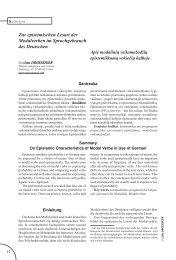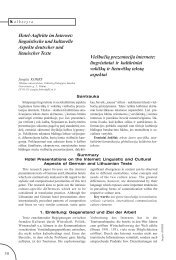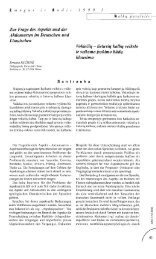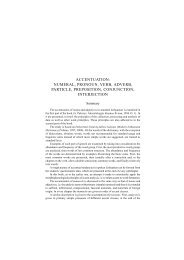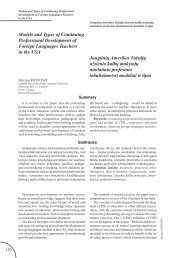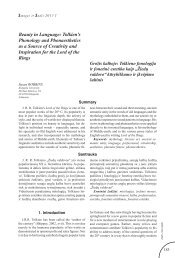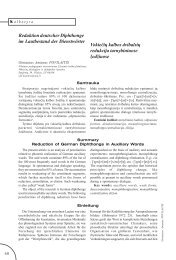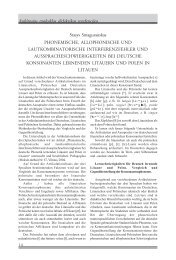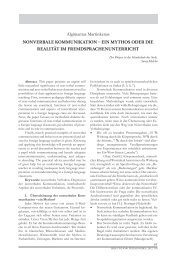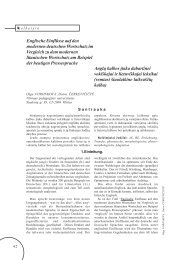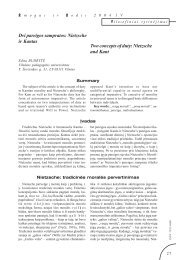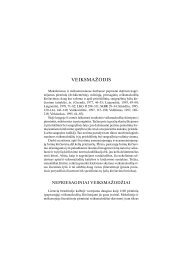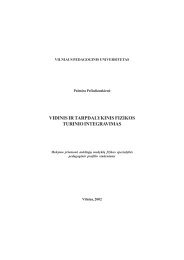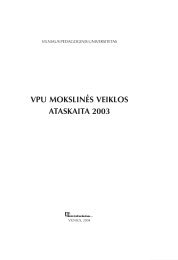Full Text - VPU biblioteka - Vilniaus pedagoginis universitetas
Full Text - VPU biblioteka - Vilniaus pedagoginis universitetas
Full Text - VPU biblioteka - Vilniaus pedagoginis universitetas
You also want an ePaper? Increase the reach of your titles
YUMPU automatically turns print PDFs into web optimized ePapers that Google loves.
20<br />
Power Relations and Politeness<br />
professional position, i.e. they have power. Those<br />
who are in a lower social position and have less<br />
power tend to rely heavily on negative politeness<br />
strategies to express the deference. Those who<br />
possess power can go to extremes while<br />
communicating with their less powerful partners;<br />
they can either hide their power by also resorting to<br />
negative politeness strategies or show it openly by<br />
using bald on record non-redressive acts.<br />
Turn-taking and hedging play a crucial role in<br />
expressing power relations and positive/negative<br />
Brown P., Levinson S. C., 2000. Politeness: Some<br />
Universals in Language Usage. In: The Discourse<br />
Reader ed. by A. Jaworsky and N. Coupland. -<br />
London & New York: Routledge.<br />
Cutting J., 2003. Pragmatics and Discourse. - London &<br />
New York: Routledge.<br />
Fairclough N., 1991. Language and Power. - London &<br />
New York: Longman.<br />
Fairclough N., 1997. Critical Discourse Analysis. - London<br />
& New York: Longman.<br />
Goffman E., 2000. On Face-work: An Analysis of Ritual<br />
Elements in Social Interaction. In: The Discourse<br />
Reader ed. by A. Jaworsky and N. Coupland.-<br />
London & New York: Routledge.<br />
Holmes J., 1999. Women, Men and Politeness. - Longman<br />
Group UK Limited.<br />
Holmes J., 2000. Women, Men and Politeness:<br />
Agreeable and Disagreeable Responses. In: The<br />
Discourse Reader ed. by A. Jaworski and<br />
N. Coupland. - London & New York: Routledge.<br />
References<br />
Valios raiðkos priemonës ir mandagumas<br />
politeness. A more powerful speaker usually<br />
possesses greater opportunities to control the length<br />
of the turns, their content and direction.<br />
Hedging is a powerful instrument in expressing<br />
negative politeness; on the other hand, some hedges<br />
serve as strategies for showing positive politeness.<br />
It should be mentioned, however, that so far there<br />
does not exist a detailed inventory of hedging devices<br />
and there is no unanimous agreement how to label<br />
one or another language item which serves as a hedge<br />
in a concrete situation.<br />
Hoye L., 1997. Adverbs and Modality in English. -<br />
London & New York: Longman.<br />
Kress G., 1990. Linguistic Processes in Sociocultural<br />
Practice. - Hong Kong: OUP.<br />
Markkanen R. & Schröder H. Hedging: A Challenge for<br />
Pragmatics and Discourse Analysis. http://<br />
www.sw2.euv-frankfurt-o.de/Publikationen/<br />
hedging/markkane/markkane.html accessed<br />
20006 02 02<br />
Malinowski B., 2000. On Phatic Communication. In:<br />
The Discourse Reader ed. by A. Jaworski and N.<br />
Coupland. - London & New York: Routledge.<br />
Short M., 1996. Exploring the Language of Poems, Plays<br />
and Prose. - Longman/ Pearson.<br />
Tannen D., 2003. Women and Indirectness. In:<br />
J. Cutting Pragmatics and Discourse. - London &<br />
New York: Routledge.<br />
Wodak R., 1996. Disorders of Discourse. - London &<br />
New York: Longman.<br />
Janina BUITKIENË



